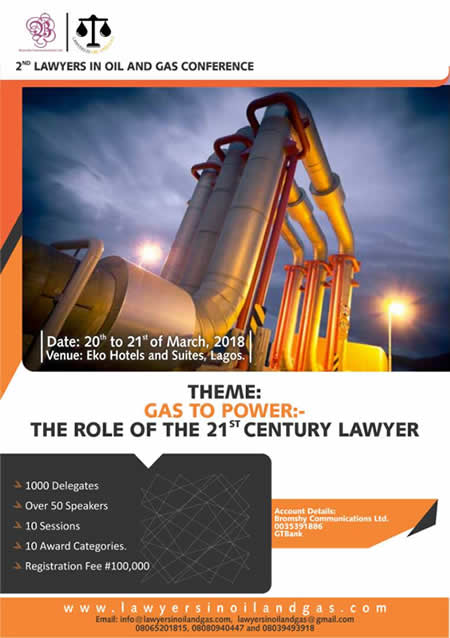The second Lawyers in Oil and Gas conference holds on the 20th and 21st of March at Eko Hotel Lagos. The conference which has become one of the most anticipated event in the legal community parades top notch speakers and themes which lawyers look forward to when it opens next week.
The Programme includes:
Day 1 (Tuesday, 20th of March 2018)
09:00am – 09:05am Opening ceremony – National Anthem
09:05am – 09:30am Introductions of Invited guests
09:30am – 09:40am Welcome Address
09:40am – 10:00am Keynote Lecture
09:30am – 10:00am Goodwill messages
10:00am – 10:30am Session Break
10:30am – 12:00am (SESSION II) APPRAISING THE REGULATORY FRAMEWORK IN NIGERIA’S ENERGY SECTOR.
The oil and gas sector in the Nigerian economy is under the sovereign authority of the Government. The government exercises these functions through its enactments of various legislation and regulatory authorities to oversee the administration of the oil and gas industry.
This session therefore is aimed at examining the extant laws regulating the energy sector viz-a-viz the enabling statutes and other legislation upon which the regulation is based.
12:00pm – 12:30pm Tea/ Coffee Break
12:30pm – 01:50pm (SESSION III) DOMESTIC POWER PRODUCTION IN THE AID OF SOCIO- ECONOMIC DEVELOPMENT- ROLE OF LAWYERS
Access to power is a fundamental problem of Nigeria due to failure of the government to diversify the sources of power production in domestic and commercial sector. Power are generated and delivered to households through domestic power production. Domestic power contributes the most consumed power in Nigeria.
It is therefore expected that in this session, the speakers would discuss on the role which lawyers play as agent of socio economic development.
01:50am – 02:00am Session Break
02:00pm – 03:30pm (SESSION IV) UNTANGLING THE CHALLENGES OF GENERATION AND TRANSMISSION FOR A SUSTAINABLE POWER – THE DILEMMA OF A NEW HORSE
Adequate power supply is a fundamental prerequisite to a Nation’s development. Energy sector has many weaknesses. Power generation has brought many positive results however, the administration of power also accounts for one of the reasons for failure of shortages in power generation and transmission due to the control regime adopted by different administration of government.
This session’s objective is to evaluate the identified challenges hindering the generation and transmission of power in the new era of private power distribution.
03:30pm – 04:30pm Lunch Break
04:30pm – 06:00pm (SESSION V) OVERCOMING POWER DISTRIBUTION DEFICIENCIES IN NIGERIA – A PRACTICAL APPROACH
According to research, there are approximately 600million Africans that are yet to have access to electricity. This basically is attributed to insufficient power generated which in turn affects the amount of power supplied to households.
This session shall be focused on possible recommendations on how to resolve the limitations affecting power distribution to enable more power to be delivered in Nigeria.
Day 2 ( Wednesday, 21st of March 2018)
09:00am – 10:20am (SESSION VI) MAXIMIZING THE EXPECTED FINANCIAL INFLOW: THE LEGAL CONSEQUENCES
Finance in the industry is a huge challenge. In this session, we hope to see how experts can maximize the expected cash inflow to develop the industry and the legal consequences of not doing such.
10:20am – 10:30am Session Break
10:30am – 12:00am (SESSION VII) SUITABILITY OF ARBITRATION AS DISPUTE RESOLUTION MECHANISM.
Arbitration is one of the oldest form of Alternative Dispute Resolution. Arbitration is a process whereby parties agree to refer their dispute to a neutral third party known as Arbitrator who works out a mode whereby parties would be compelled to use the terms adopted in their agreement or the law to resolve the dispute between the warring parties amicably.
This session covers the reason why arbitration is the most suitable mode of dispute resolution to be adopted in energy disputes.
12:00pm – 12:30pm Tea/ Coffee Break
12:30pm – 01:50pm (SESSION VIII) DEVELOPMENT THROUGH TAXATION: NECESSARY ACTION ON INCENTIVE AND TAXATION.
Tax incentives are ways of reducing taxes for businesses and individuals in exchange for desirable actions or investments on their part. Tax is a levy charged by government on a product, income or activity. Revenue accruing to Nigeria’s economy comes majorly from oil and gas, thus taxation plays an important role in revenue mobilisation.
Government introduced tax incentives. This session is aimed at discussing the tax incentives available to energy sector and how government has developed several forms of incentives over the years.
01:50am – 02:00am Session Break
02:00pm – 03:30pm (SESSION IX) MAXIMIZING THE POTENTIALS OF ICT FOR ENERGY PROSPERITY
ICT is an enabler of energy efficiency and has a major role to play to assist a country reach its energy consumption target. It has impacted on energy consumption in developed countries and if fully utilized, can help reduce energy consumption through application of new technologies.
This session aims to explore the possible ways which ICT can help improve energy production and transmission.
03:30pm – 04:30pm Lunch Break
04:30pm – 06:00pm (SESSION X) EVALUATING ENVIRONMENTAL AND SAFETY BORDERLINES: BALANCING THE CONFLICTING INTEREST OF GROWING THE ECONOMY & PROTECTING THE ENVIRONMENT IN THE PRODUCTION OF ENERGY.
When coal and fossil fuels are burnt, carbon mono oxides are emitted thereby polluting the atmosphere and climate change then occurs. On the other hand, oil revenue is a major source of Nigeria’s income. Several failed attempts have however been adopted to reduce the greenhouse effect of gas emission in the climate
This session aims at discussing how to balance the negative effect of gas emission viz-a-viz the role oil and gas plays in Nigeria’s economy.
Contact:
26, Mckarthy Street, Onikan Lagos. Nigeria.
Phone: 08065201815, 08080940447
Email: bromsycom@yahoo.com
lawyersinoilandgas@gmail.com
info@lawyersinoilandgas.com




Hi, just required you to know I he added your site to my Google bookmarks due to your layout. But seriously, I believe your internet site has 1 in the freshest theme I??ve came across. Seo Hizmeti Skype : live:by_umut